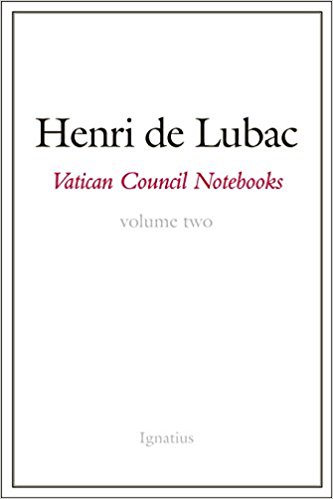
|
Vatican Council Notebooks: Volume 2
by Henri de Lubac.
Ignatius Press; Annotated edition (October 5, 2016). 536 pages.
"Surprising news!" With these words, Fr. Henri de Lubac,S.J., whose orthodoxy had been so vigorously attacked, responded to the announcement of his selection to participate in the 2nd Vatican Council. His participation as a theologian and expert would make a lasting impact on the Council, and his insights and comments are recorded in these long-awaited volumes.
This is the second Volume of De Lubac's Notebooks, which trace the two years of preparation, the four conciliar sessions, and the three periods between sessions. The eminent theologian de Lubac is a sure guide for the reader, introducing us to the theological ferment of the Council and helping us to grasp what was at stake in the often animated debates.
De Lubac does not hesitate to express clearly what he thinks of the theologians around him, of the new concepts appearing because of the Council, or of the problems he judges to be most serious for the Christian faith. These Notebooks invite us to a greater historical and theological understanding of the Council.
|
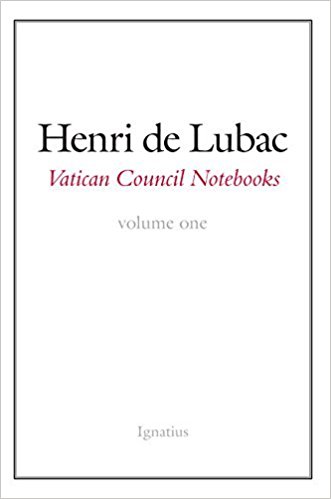
|
Vatican Council Notebooks: Volume One
by Henri de Lubac.
Ignatius Press
These Notebooks trace the two years of preparation for the 2nd Vatican Council, the four conciliar sessions, and the three periods between sessions. They give us the opportunity to assist at the discussion of the schemas (initial drafts of conciliar texts), but also, during the meetings of the theological commission and the sub-commissions, at the elaboration and correction of the texts submitted to the Council fathers. The eminent theologian de Lubac is a sure guide for the reader, introducing us to the theological ferment of the Council and helping us to grasp what was at stake in the often animated debates.
|
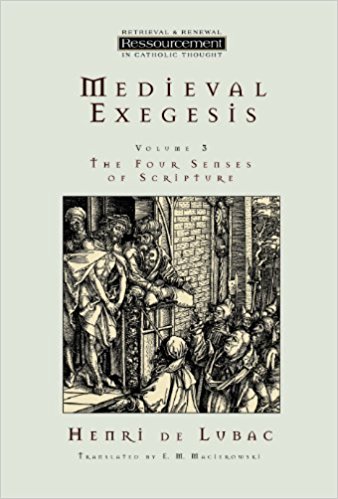
|
Medieval Exegesis: The Four Senses of Scripture
by Henri de Lubac.
Eerdmans (September 1, 2009). 800 pages.
Originally published in French as Exégèse médiévale, Henri de Lubac’s monumental, multivolume study of medieval exegesis and theology has remained one of the most significant works of modern biblical studies. Examining the prominent commentators of the Middle Ages and their texts, de Lubac elucidates the medieval approach to biblical interpretation that sought “the four senses” of Scripture, especially the dominant practice of attempting to uncover Scripture’s allegorical meaning.
|
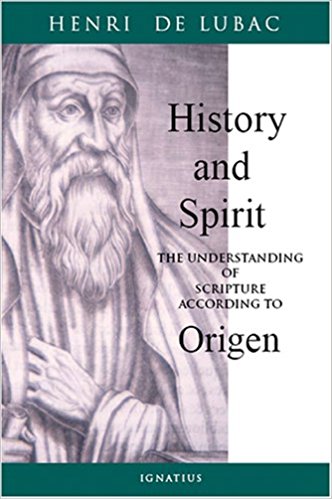
|
History and Spirit: The Understanding of Scripture According to Origen
by Henri de Lubac.
Ignatius Press; First Thus edition (April 2007). 507 pages.
Origen (185-ca. 254), one of the most prolific and influential of the early Church Fathers, is best known to us for his Scripture exegesis. Henri de Lubac's History and Spirit is a landmark study of Origen's understanding of Scripture and his exegetical methods. In exploring Origen's efforts to interpret the four different senses of Scripture, de Lubac leads the reader through an immense and varied work to its center: Christ the Word.
|
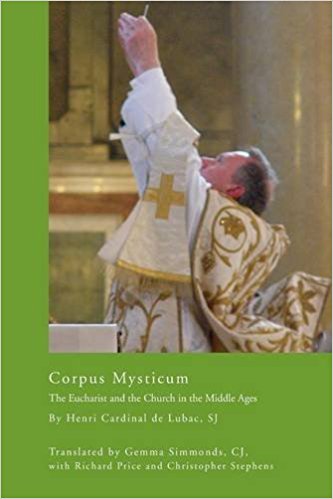
|
Corpus Mysticum: The Eucharist and the Church in the Middle Ages
by Henri de Lubac S.J. (Author), Gemma Simmonds C.J. (Translator).
University of Notre Dame Press; 1 edition (September 1, 2007). 360 pages.
One of the major figures of twentieth-century Catholic theology, Henri Cardinal de Lubac was known for his attention to the doctrine of the church and its life within the contemporary world. In Corpus Mysticum de Lubac investigates a particular understanding of the relation of the church to the eucharist. He sets out the nature of the church as communion, a doctrine that influenced the thinking of the Second Vatican Council.
With the publication of Corpus Mysticum, this important text of contemporary Catholic ecclesiology and sacramental theology is available for the first time in an English translation. Its publication fills a significant gap in the range of de Lubac's works available to English-speaking scholars. It will be an important resource in the widespread and ongoing ecumenical discussions among Catholic, Protestant, and Orthodox theologians.
"This translation of Corpus Mysticum is a gift to medieval historians, liturgists, ecclesiologists, and any Christian interested in a profoundly prophetic reading of one of the central mysteries of her or his religion. This is one of a very few books that has formed our present consciousness of who we are as Catholics and Christians. To preserve access to it will significantly aid our attempts to move into a future to some extent already foreshadowed in de Lubac's study of the past." —Gary Macy, University of San Diego
|
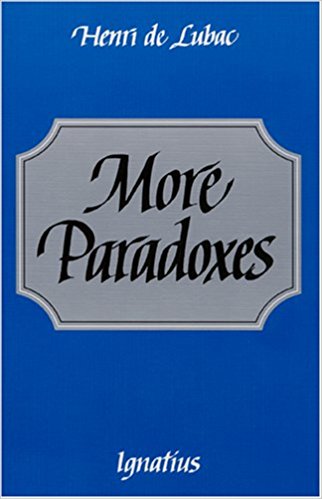
|
More Paradoxes
by Henri de Lubac.
Ignatius Pr (March 2002). 131 pages.
Following up his first book, Paradoxes of Faith, containing wonderful, short reflections on themes of Christianity and the spiritual life, this second book presents more thought-provoking gems that once again illustrate the magnificent language, clarity, spiritual understanding and shrewd discernment of the great theologian and spiritual writer Henri de Lubac, S.J.
These insights by Father de Lubac on a variety of subjects are rich and profound meditations, aphorisms and pieces of wisdom that express the freshness, incongruities and challenges of life. This is a book of inspiration by a master of the spiritual life that provides excellent material for prayer and meditation, as well as great homily ideas for the clergy.
|
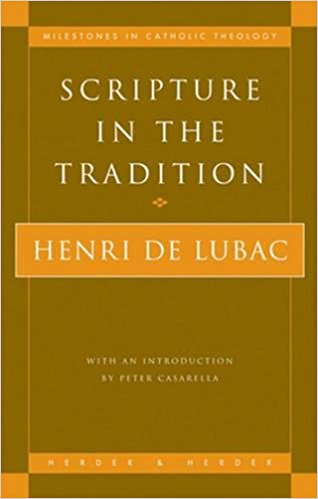
|
Scripture in the Tradition
by Henri de Lubac (Author), Peter Casarella (Introduction).
The Crossroad Publishing Company (February 1, 2001). 268 pages.
The Crossroad Publishing Company once again makes available this examination of the quality and quantity of the "spiritual understanding" of Scripture that developed during the Christian centuries. Far from believing that modern exegetical insights and abilities make earlier interpretations of Scripture naive curiosity, de Lubac communicates to the modern reader his own appreciation and knowledge of the irreplaceably creative role that exegesis of the church fathers and of medieval theologians played in the survival and formulating of Christianity. Even more fundamentally, he links the process of exegesis to the permanent foundation of Christian thought, demonstrating that all forms of scriptural exegesis are part of the ongoing reflective life of God and the process by which the human race learns to share in this mystery.
|
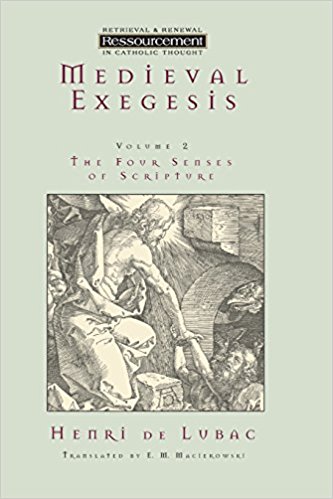
|
Medieval Exegesis : The Four Senses of Scripture, Vol. 2
by Henri de Lubac.
Eerdmans; First American edition (October 4, 2000). 453 pages.
Originally published in French as Exégèse médiévale, Henri de Lubac's multivolume study of medieval exegesis and theology has remained one of the most significant works of modern biblical studies. Available now for the first time in English, this long-sought-after second volume of Medieval Exegesis, translated by E. M. Macierowski, advances the effort to make de Lubac's major study accessible to the widest possible audience.
|
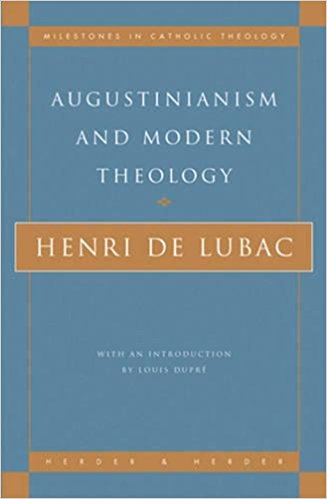
|
Augustinianism and Modern Theology
by Henri de Lubac (Author), Louis Dupré (Introduction).
The Crossroad Publishing Company; Revised ed. edition (May 1, 2000). 312 pages.
This companion volume to The Mystery of the Supernatural focuses on the idea of pure nature and its origins in nominalist readings of Augustine.
|
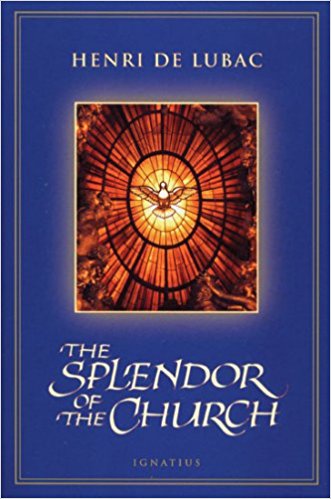
|
The Splendor of The Church
by Henri de Lubac.
Ignatius Press; New edition edition (January 1, 1999). 384 pages.
Considered by many the bright jewel among the many enriching books of Cardinal Henri de Lubac, this work is a hymn to the beauty of the Church, under some of whose leaders for a time he unjustly suffered. The Splendor of the Church is, in a sense, a personal testimony of the great theologian's humility and love of the Church of Christ. It is also a classic work in the theology of the Church. Indeed, de Lubac's profound insights significantly contributed to Vatican II's Dogmatic Constitution on the Church, Lumen Gentium, especially in its treatment on the Church as mystery and as the Sacrament of Christ.
|
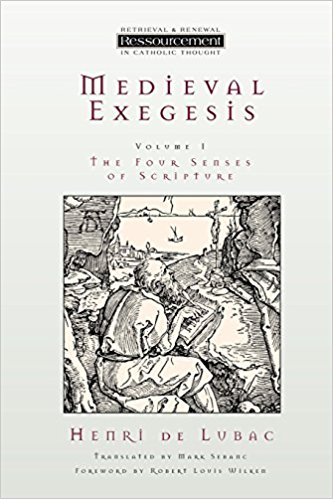
|
Medieval Exegesis: The Four Senses of Scripture, Vol. 1 (Ressourcement: Retrieval & Renewal in Catholic Thought)
by Henri de Lubac.
Eerdmans (April 17, 1998). 489 pages.
Originally published in French as Exégèse médiévale, Henri de Lubac's multivolume study of medieval exegesis and theology has remained one of the most significant works of modern biblical studies. Available now for the first time in English, this long-sought-after volume is an essential addition to the library of those whose study leads them into the difficult field of biblical interpretation.
The first volume in de Lubac's multivolume work begins his comprehensive historical and literary study of the way Scripture was interpreted by the church of the Latin Middle Ages.
Examining the prominent commentators of the Middle Ages and their texts, de Lubac discusses the medieval approach to biblical interpretation that sought "the four senses" of Scripture, especially the dominant practice of attempting to uncover Scripture's allegorical meaning. Though Bible interpreters from the Enlightenment era on have criticized such allegorizing as part of the "naivete of the Middle Ages," de Lubac insists that a full understanding of this ancient Christian exegesis provides important insights for us today.
|
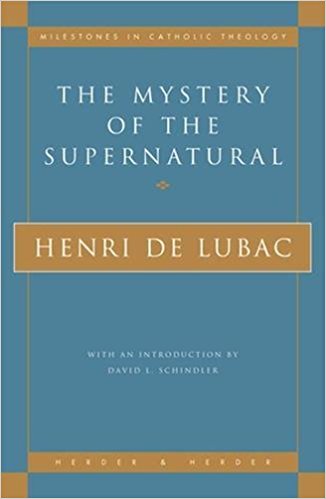
|
The Mystery of the Supernatural
by Henri de Lubac.
The Crossroad Publishing Company (May 1, 1998). 286 pages.
First published in 1965, this book represents a refinement and further development of the core thesis that Henri de Lubac had originally put forward many years earlier in a bold and controversial work in which he first called into question the idea of pure nature.
|
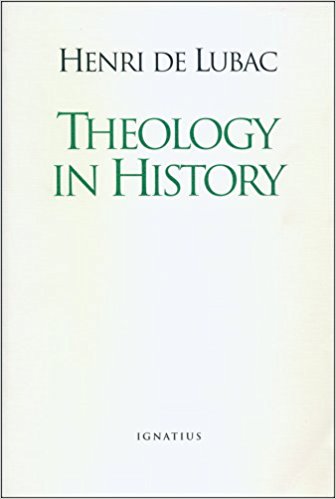
|
Theology in History: The Light of Christ, Disputed Questions and Resistance to Nazism
by Henri de Lubac.
Ignatius Press (October 1, 1996) 625 pages.
The unique insight and impressive scholarship of the eminent French theologian Cardinal Henri de Lubac are clearly evident in this volume of collected articles and essays. An article of great timeliness on the priesthood according to St. John Chrysostom as well as an important study of the long debate over the salvation of Origen are among the texts included in the first section, devoted to patristics and Christian humanism. The second section, comprised entirely of an unpublished work on tripartite anthropology tracing the body-soul-spirit distinction from St. Paul, the patristic tradition, St. Augustine and St. Thomas Aquinas, up to the modern period, will prove an invaluable guide for further study and reflection. The section concludes with a beautiful text entitled "The Light of Christ", a prayerful meditation written during the dark hours of Nazi domination. Section three deals with disputed theological questions such as the internal causes of the disappearance of the sense of the sacred, the mystery of the supernatural, and the development of dogma. He also has a section on Christian resistance to Nazism and anti-semitism, as well as two sections on the thought and writings of several important modern spiritual writers.
|
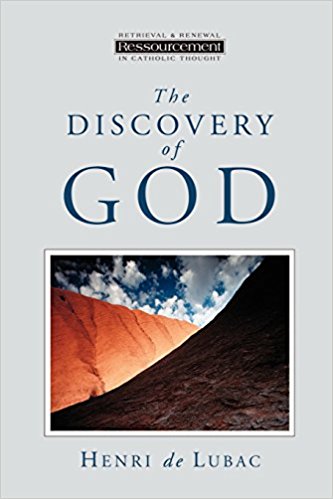
|
The Discovery of God
by Henri de Lubac.
Wm. B. Eerdmans Publishing Co.; First Thus edition (December 18, 1996). 232 pages.
The Discovery of God contains the guiding thread of all of Henri de Lubac's work: the idea of God and the life of the spirit.
|
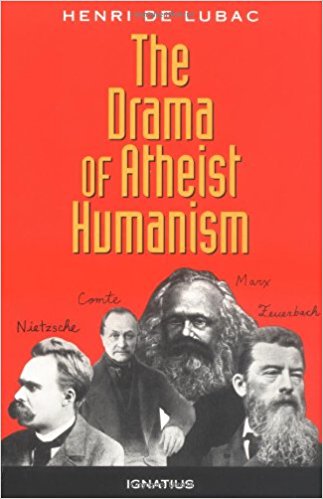 The Drama of Atheist Humanism The Drama of Atheist Humanism
|
by Henri de Lubac (Author), Mark Sebanc (Translator)
Ignatius Pr (October 1, 1995). 593 pages.
Henri de Lubac, S.J. traces the origin of 19th century attempts to construct a humanism apart from God, the sources of contemporary atheism which purports to have "moved beyond God." The three persons he focuses on are Feuerbach, who greatly influenced Marx; Nietzsche, who represents nihilism; and Comte, who is the father of all forms of positivism. He then shows that the only one who really responded to this ideology was Dostoevsky, a kind of profit who criticizes in his novels this attempt to have a society without God. Despite their historical and scholarly appearance, de Lubac's work clearly refers to the present. As he investigates the sources of modern atheism, particularly in its claim to have definitely moved beyond the idea of God, he is thinking of an ideology prevalent today in East and West which regards the Christian faith as a completely outdated.
|
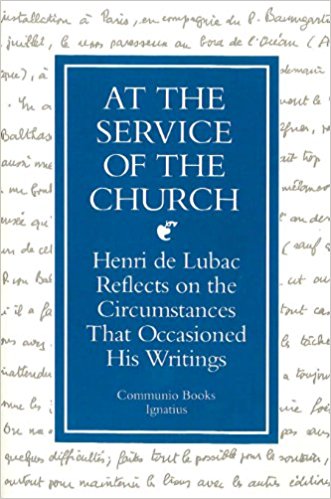
|
At the Service of the Church: Henri de Lubac Reflects on the Circumstances That Occasioned His Writings
by Henri de Lubac.
Ignatius Press; n edition (October 1, 1992). 411 pages.
This book includes essays, notes, and reviews reflecting the fundamental ideas and key writings of Henri de Lubac, one of the greatest theologians of the twentieth century. In these pages Cardinal de Lubac explains the origin, meaning, and fate of his works, in the context of his life, studies, personal relationships, as well as his legendary exiles, and his later vindication. At the Service of the Church provides crucial insights into the work of a man who profoundly shaped the Church, including the teaching of the Second Vatican Council. No student of contemporary theology can afford to neglect de Lubac's work and this book gives readers a unique perspective on that work. This volume is also an important source for understanding the renewed theological debates regarding nature and grace, the natural desire for God, and the authentic interpretation of St. Thomas Aquinas.
|
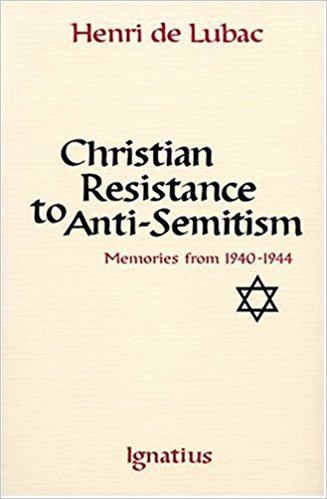
|
Christian Resistance to Anti-Semitism: Memories from 1940-1944
by Henri de Lubac (Author), Elizabeth Englund (Translator).
Ignatius Press (April 1990). 261 pages.
|
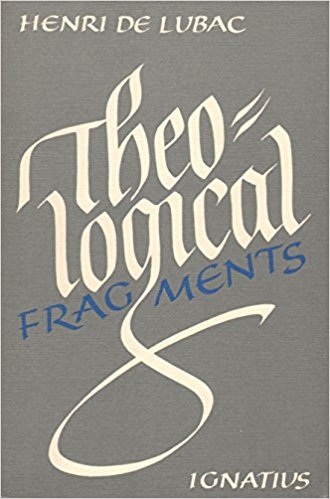
|
Theological Fragments
by Henri de Lubac (Author), Rebecca Howell Balinski (Translator).
Ignatius Press (April 1, 1989). 441 pages.
|
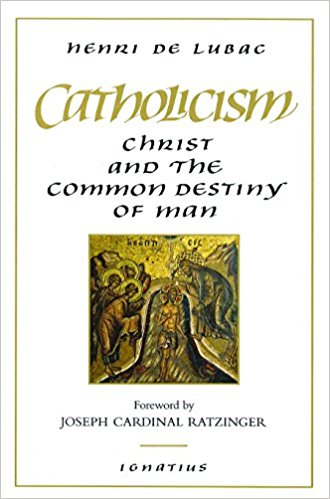
|
Catholicism: Christ and the Common Destiny of Man
by Henri de Lubac.
Ignatius Press (November 1, 1988). 443 pages.
With a Foreword by Joseph Cardinal Ratzinger/Pope Benedict XVI. This book first appeared just over fifty years ago. It is the pilgrimatic work of one of the 20th century's greatest theologians. Deeply rooted in tradition, it breaks ground and sows seeds which will bear their fruit in the Second Vatican Council's central documents on the Church. Here, Henri de Lubac, one of the giants of 20th century theology, gathers from throughout the breadth and length of Catholic tradition elements which he synthesizes to show the essentially social and historical character of the Catholic Church and how this worldwide and agelong dimension of the Church is the only adequate matrix for the fulfillment of the person within society and the transcendence of the person towards God. This book is a classic that deserves to be read and reread by every educated Catholic.
|
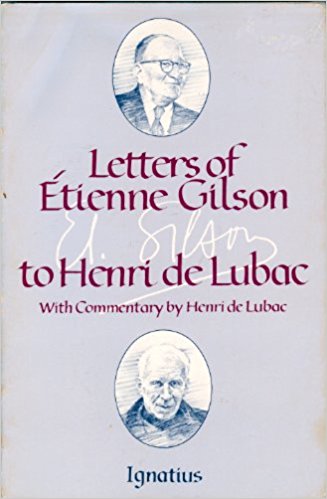
|
Letters of Etienne Gilson to Henri De Lubac (English and French Edition)
by Etienne Gilson, Henri De Lubac.
Ignatius Pr; First English Edition edition (April 1, 1988). 247 pages.
|
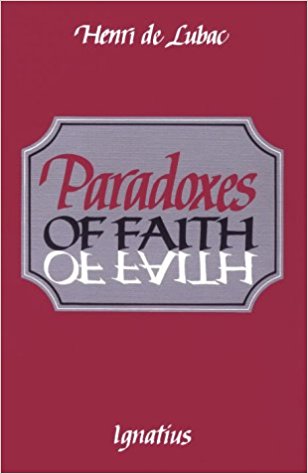
|
Paradoxes of Faith
by Henri de Lubac (Author), Sadie Kreilkamp (Translator).
Ignatius Press (April 1, 1987). 236 pages.
These profound pieces are the fruit of Cardinal Henri de Lubac's lifelong study of the paradoxes of the Christian faith. They are rich and thought-provoking gems, spiritual aphorisms, and meditative reflections, which explore the incongruities and the challenges of the spiritual life.
De Lubac’s magnificent language, clarity, spiritual understanding, and shrewd discernment are on display in every chapter, as he discusses a variety of topics including Christian witness, incarnation, suffering, and faith. His mastery of the subjects is the result not only of intellectual study but of a life lived for Christ even in the darkest of times, as when he participated in the underground resistance to the Nazi occupation of France.
|
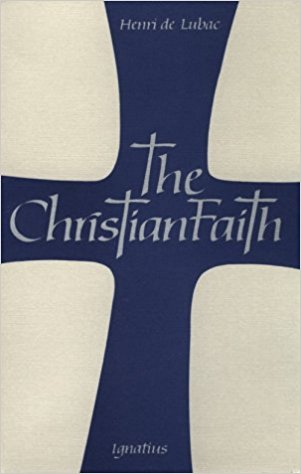
|
Christian Faith: An Essay on the Structure of the Apostles' Creed
by Henri de Lubac.
Ignatius Press (May 1, 1986). 353 pages.
De Lubac shows that Christian Tradition is a living force and in the Apostle's Creed there is both depth and relevance for today's understanding of the Christian message.
|
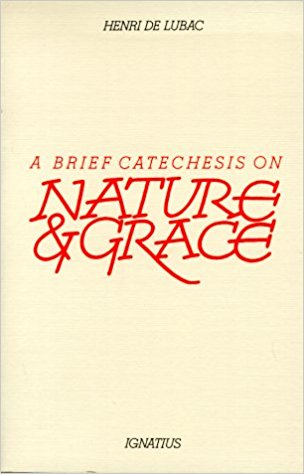
|
Brief Catechesis on Nature and Grace
by Henri De Lubac.
Ignatius Pr; First American edition (May 28, 1984). 308 pages.
An English translation of an 1980 Catholic book originally written in French by a renowned theologian, with three major sections and five appendices.
|

|
The Motherhood of the Church: Followed by Particular Churches in the Universal Church
by Henri de Lubac.
Ignatius Press (January 1, 1983). 364 pages.
Priests are called "Father" and the Church is called "Mother". Our "Holy Mother the Church" is a traditional way of speaking among Catholics. But are these outdated, sentimental expressions? Or do they express a deep insight into the nature of the Church as a whole and of ordained ministry in relation to the Church? Is there a genuine theological meaning to the traditional reference to the Church as "she"?
Henri de Lubac addresses such questions with his usual profound erudition. He deeply mines the Christian tradition in examining the Motherhood of the Church. Focusing on the Church's Motherhood allows this great theologian to unite two profound truths: the Church is the Bride of Christ and the Church is Christ's Mystical Body. As de Lubac shows, the Church cannot be rightly considered apart from Christ and his saving work, both of which should be understood in light of the mystery of the Church's maternity.
|
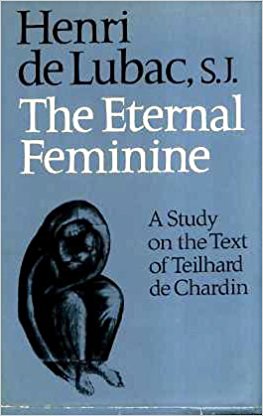
|
Eternal Feminine: A Study of the Poem by Teilhard de Chardin Followed by Teilhard and the Problems of Today
by Henri de Lubac (Author), René Hague (Translator).
Collins (March 15, 1971). 256 pages.
|
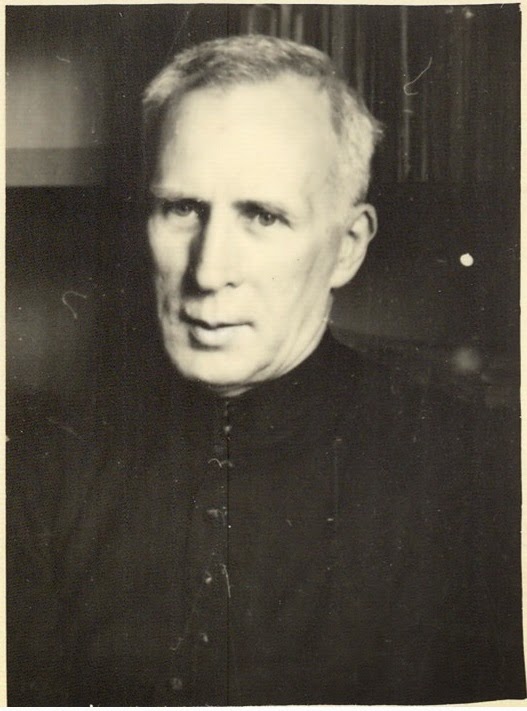 Henri de Lubac, S.J. (1896-1991) was a French Jesuit and one of the greatest theologians of the twentieth century. Born in Cambrai, France on February 20, 1896, he joined the Society of Jesus in Lyon on October 9, 1913. He served in the French army during the First World War, suffering severe wounds in combat. He was educated at the Jesuit Houses of study at Jersey and Fourvière, and then earned his doctorate in theology at the Pontifical Gregorian University in Rome.
Henri de Lubac, S.J. (1896-1991) was a French Jesuit and one of the greatest theologians of the twentieth century. Born in Cambrai, France on February 20, 1896, he joined the Society of Jesus in Lyon on October 9, 1913. He served in the French army during the First World War, suffering severe wounds in combat. He was educated at the Jesuit Houses of study at Jersey and Fourvière, and then earned his doctorate in theology at the Pontifical Gregorian University in Rome. 
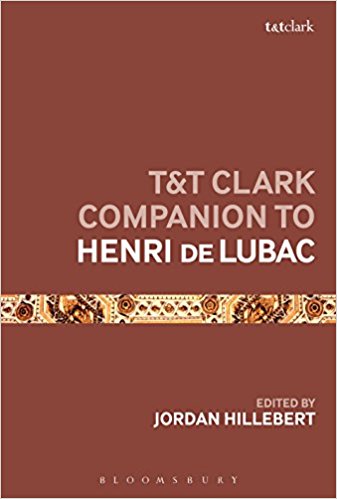
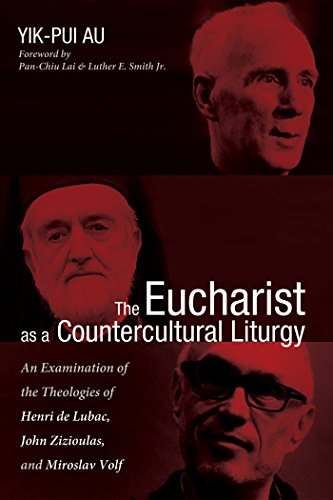
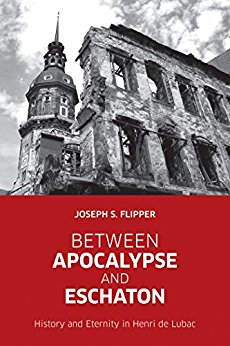
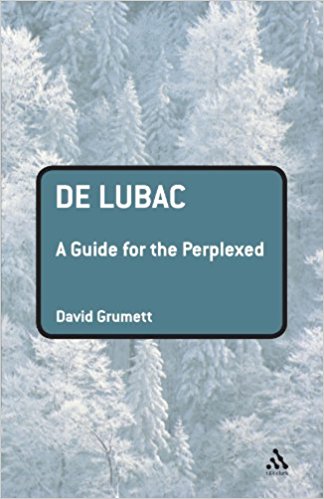
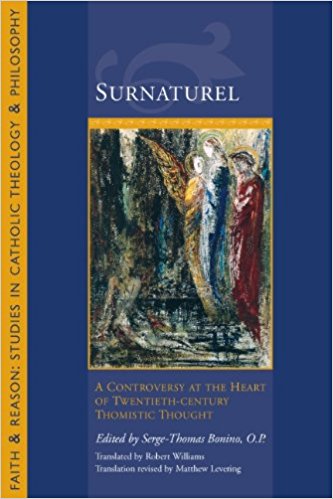
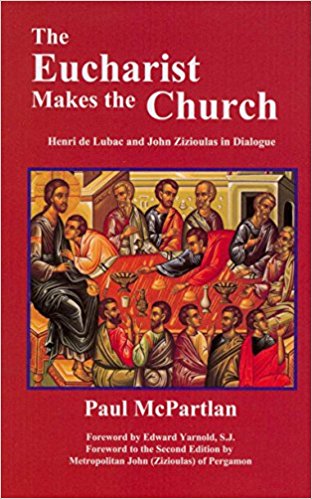
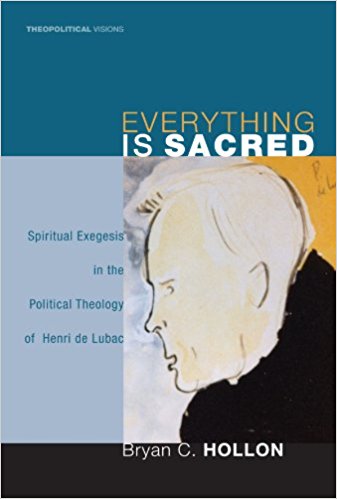
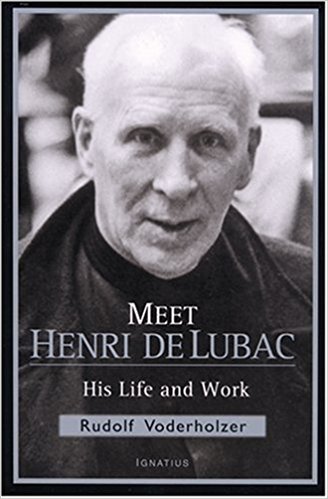
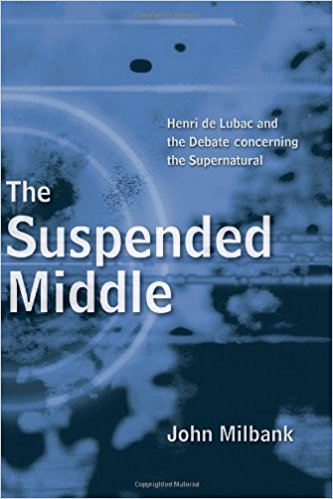















 The Drama of Atheist Humanism
The Drama of Atheist Humanism








